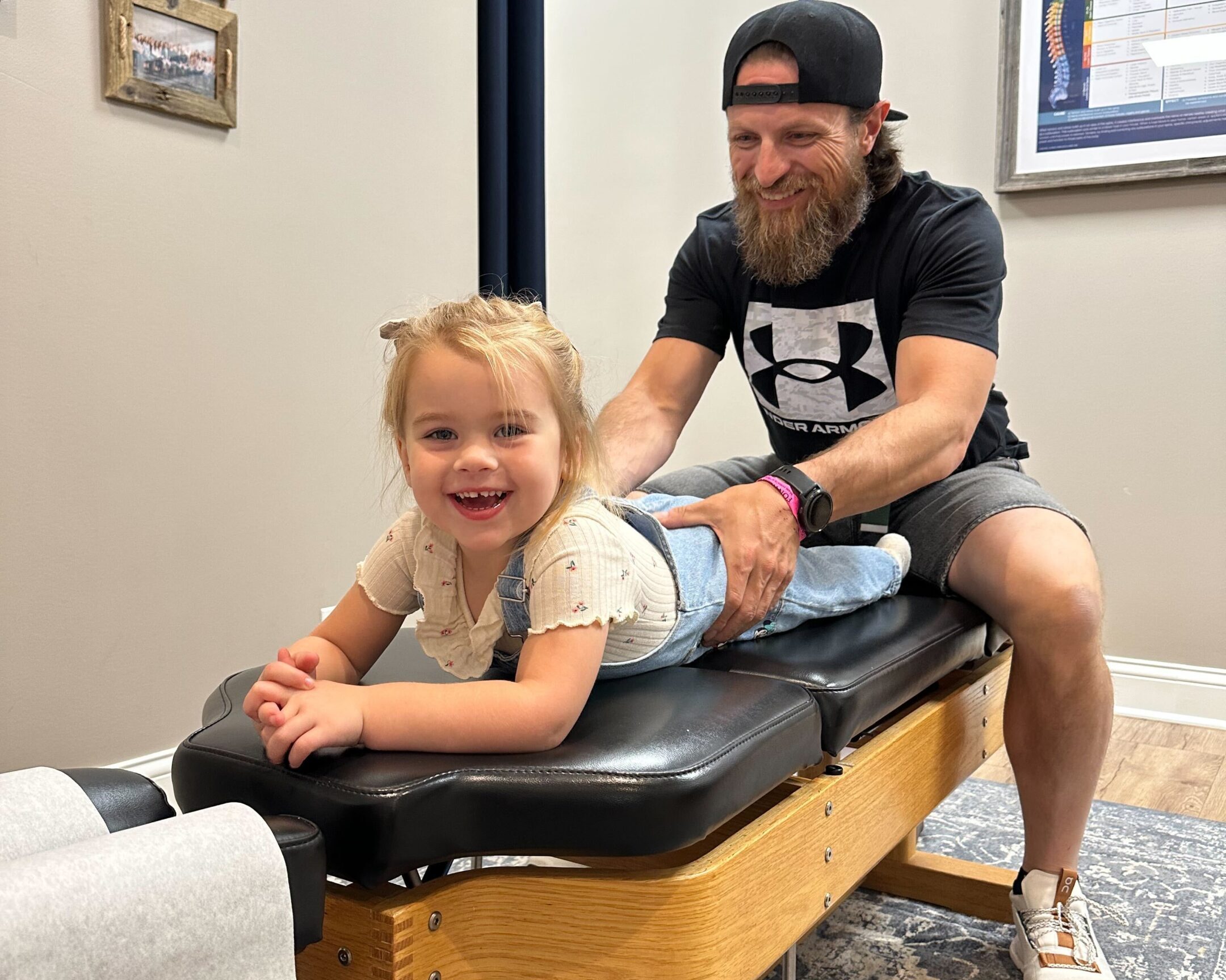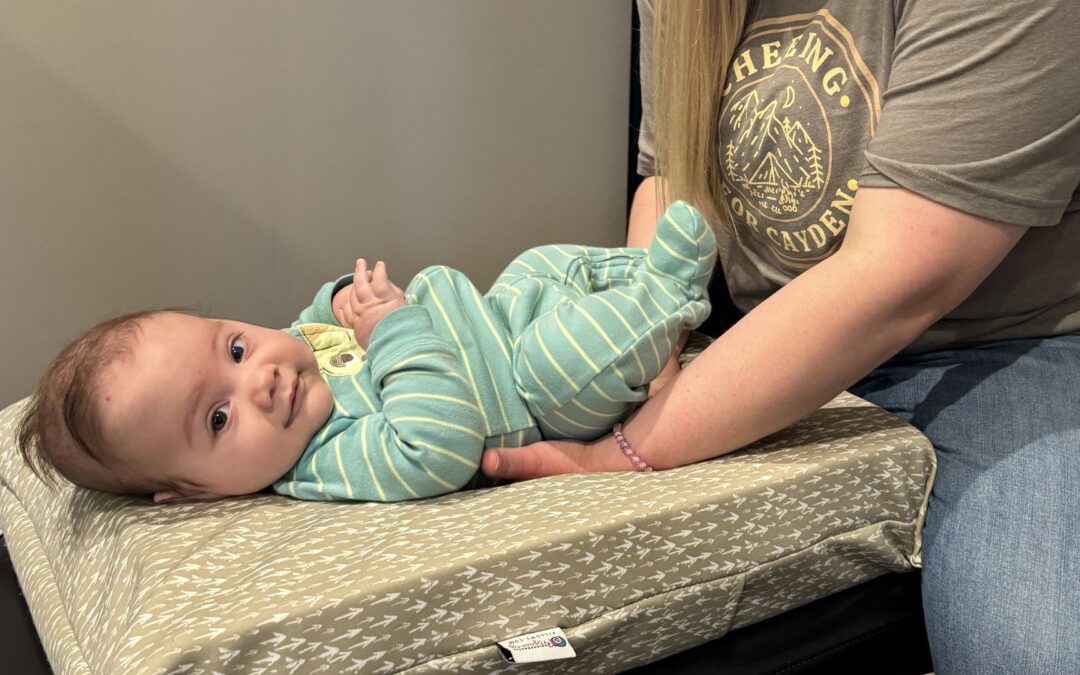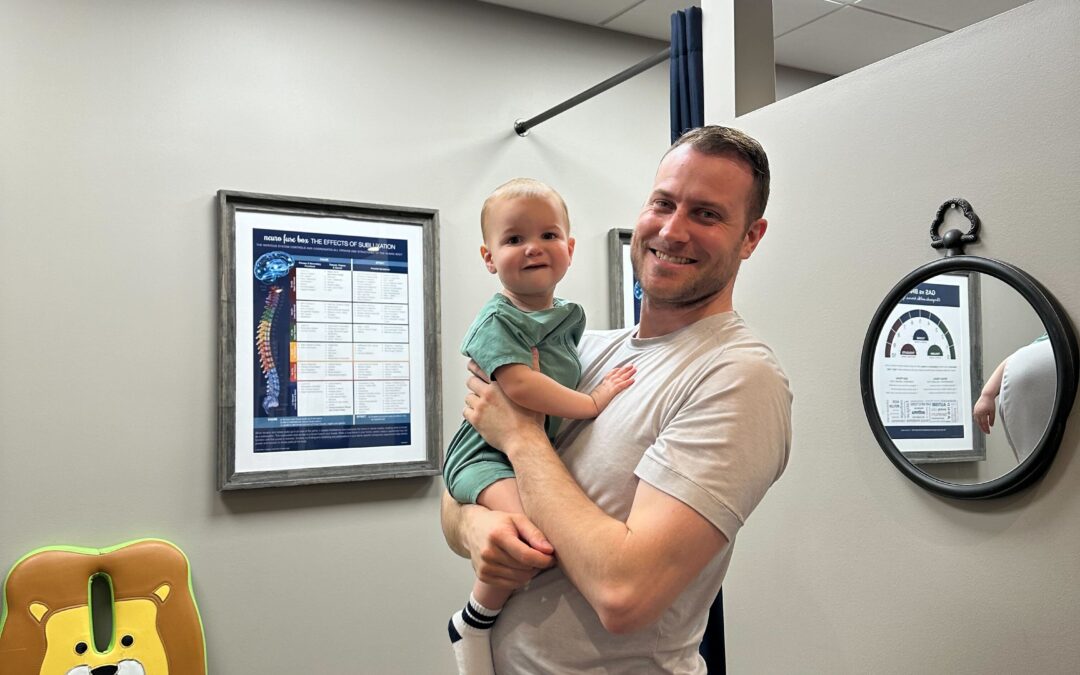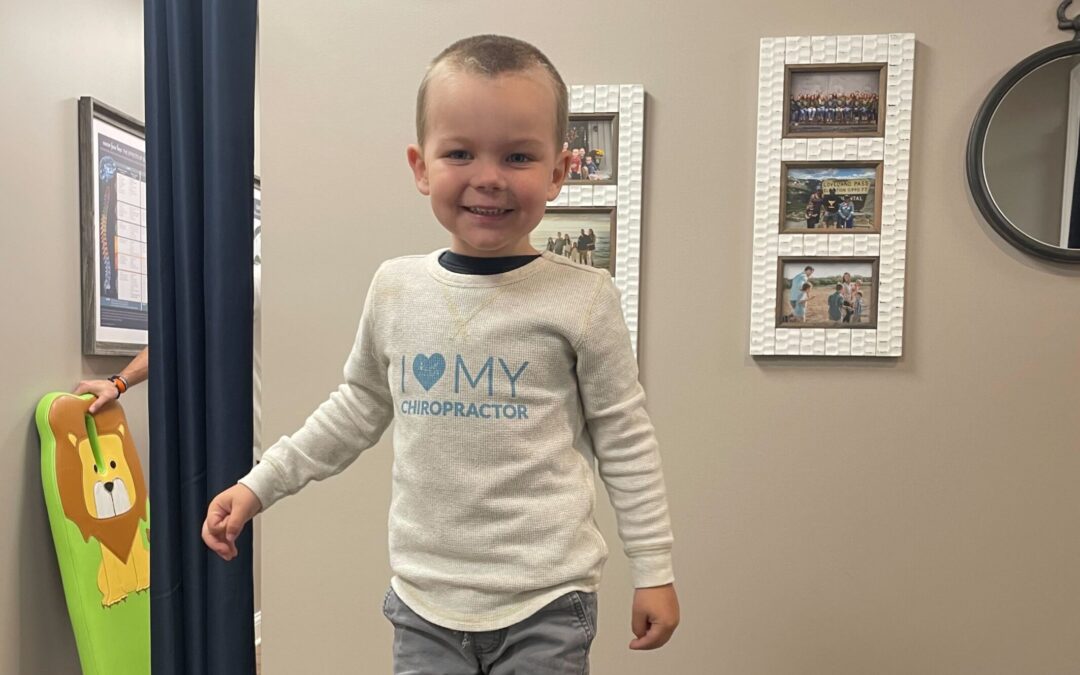When we first met Nolan, he struggled A LOT with gross motor skills, nonverbal speech, and sensory and motor planning. He was 2 years old and recently diagnosed with autism. His developmental delays were not only limiting his current quality of life, but the road ahead looked even more challenging because he had fully plateaued and stopped making progress in his early intervention therapies.
Before starting care with us, even walking was difficult for Nolan due to really low muscle tone and frequent stimming. Thankfully, at that point, his Occupational Therapist told his parents about our Perfect Storm Workshop and Neurologically-Focused Chiropractic Care, both of which we’ll discuss and explain in this article.
Since starting care with us, Nolan is again making incredible strides (pun intended, since he’s now running) with his development, gross motor skills, speech, sensory processing, stimming, and so much more! You can see the immediate calm and improvements in coordination with each and every adjustment, and he instantly smiles and melts our hearts each and every week.
What is a Developmental Delay?
Developmental delays refer to a significant lag in a child’s milestones compared to their peers. These milestones include cognitive, social, emotional, speech and language, and motor skills.
As children grow and develop, they are expected to achieve these milestones within specific age ranges, serving as crucial indicators of their overall development.
However, what is just as important or perhaps even more critical is the order and sequence they go through these developmental milestones and ensuring they do not skip any altogether. Meaning this, it’s more troublesome for a child to skip a stage of development or miss a milestone altogether than to be slightly delayed.
For example, skipping crawling is more troublesome and problematic to their overall brain and neurological development than being a couple of months late in talking, walking, and so forth.
This is why it was so alarming and concerning when the CDC recently updated their Developmental Milestones charts, took crawling out altogether, and then pushed back some core speech milestones by another 6 months. Crawling is an essential gross motor skill that helps get the right and left sides of the brain connected and coordinated together, helping improve not only motor coordination and function later on in life but cognitive development and emotional regulation as well.
Types of Developmental Delay
Developmental delays can manifest in different areas of a child’s life, and most children who struggle or have a delay in more than one of the areas below:
Motor Skills
Motor delays interfere with a child’s physical abilities, such as crawling, walking, running, and fine motor skills, like writing and drawing. Delays in gross and fine motor development are often the earliest signs and markers of delays in speech and language, social skills, behavioral and emotional regulation, and cognitive skills later on, so they need to be spotted and addressed right away.
The number one most overlooked trigger and cause of motor delays are birth interventions, birth trauma, torticollis, and plagiocephaly – all of which can be addressed early and effectively by a trained and experienced PX Doctor.
Speech and Language Skills
Children experiencing speech and language delays may have trouble forming words, articulating sounds, or comprehending language, impacting their communication ability. Additionally, since there is such a large motor component to speech formation and fluidity, the motor delays and challenges mentioned above can play a large role in challenges with speech and language as well.
Social, Emotional, and Behavioral Skills
Children with social delays find it challenging to interact and communicate with others effectively. They may struggle to pick up on social cues, exhibit inappropriate behavior, have difficulties making friends, and struggle to regulate their emotions appropriately.
Emotional delays may result in heightened emotional responses, difficulty managing emotions, or challenges in expressing feelings appropriately. Additionally, developmental delays often manifest later on as behavior issues, such as frequent temper tantrums, meltdowns, and significant Sensory Processing Disorder challenges.
Cognitive Skills
Cognitive delays affect a child’s ability to process information, think, and reason. Signs of cognitive delays may include difficulties with problem-solving, learning, and understanding concepts appropriate for their age. These delays and challenges may show up later in the child’s life and lead to a diagnosis of ADHD or other learning disorders.
What Causes Developmental Delays?
Developmental delays can stem from various factors and usually have a multifactorial cause. This means there is rarely just one thing that contributes to developmental delays and interferes with their optimal brain and neurological development.
This is why we always reference our “Perfect Storm” concept and theory when discussing developmental delays and most childhood chronic health challenges, to explain to parents that there was most likely a sequence or successive “storm” of physical, chemical, and emotional stressors that the child was exposed to very early in their development that lead to their developmental delay.
In order to truly get to the root cause of developmental delays and health challenges in children, we’ve got to go all the way back to the fertility and pregnancy journey, labor and delivery information, and early childhood case history.
The average pediatrician or therapist does not dig this deep into a child’s case history or understand full neurological development at this level and, therefore, often misses out on putting the complete clinical picture together for children and families struggling with developmental delays.
Here are the most common “Perfect Storm” developmental factors and stressors that must be investigated and adequately addressed by your child’s healthcare provider:
:
- Prenatal / Maternal Distress: A high-risk and highly stressful pregnancy can lead to the mother’s nervous system being overly stressed, anxious, and stuck in a sustained fight-or-flight sympathetic response. This, in turn, can lead to the child’s brain and nervous system developing in an excessive sympathetic neurological state as well, leading to developmental delay and other challenges later in life.
- Birth Trauma: Difficult or traumatic births can result in injuries to the most delicate and important areas that control and coordinate development for the child, including but not limited to the brainstem, cerebellum, vagus nerve, cervical spine, and so forth.
- Premature Birth: Babies born prematurely likely have an underdeveloped central and autonomic nervous system, along with other challenges with their motor, organ, and glandular systems. All of this can contribute to developmental delays.
- Sleep Challenges and Disorders: Children who struggle with sleep disorders and difficulty falling asleep or staying asleep (or both) are often more likely to struggle with developmental delays since sleep is essential to optimal brain development and overall function.
- Poor Nutrition and Early Exposure to Toxins: Inadequate nutrition during crucial stages of development can hinder a child’s growth, and exposure to toxins can cause their nervous system to shift into a sympathetic state and contribute to excessive inflammation, both of which can contribute to developmental delays.
- Subluxation and Dysautonomia: While most parents and professionals may not immediately recognize these two terms, understanding their role in developmental delay and pediatric health challenges is essential to getting complete healing and restoration in play for your child.
Simply put, when a child is struggling with subluxation and dysautonomia, their entire nervous system ends up stuck in that sympathetic fight-or-flight response and remains out of balance and dysfunctional until they are addressed in full by a trained and experienced Pediatric Chiropractor, like those in our PX Docs Network.
Chiropractic Care for Developmental Delay
Neurologically-Focused Chiropractic Care offers an entirely unique approach to supporting children with developmental delays. While most pediatricians continue to deploy the “watch and wait” approach, and incredible movement-based therapists (PT, OT, Speech) work on the motor and musculoskeletal components, we address the root cause head-on.
Since each developmental delay is primarily rooted in a stuck and dysfunctional brain and nervous system, any hope at full and complete recovery must start with a full and complete neurological focus.
Through gentle Neuro-Tonal Adjustments, our PX Doctors can address the subluxations and dysautonomia that are keeping the nervous system stressed and out of balance in the first place. From there, we can see a child’s motor tone and coordination improve almost instantly, which then, in turn, helps get their motor development back on track.
Then, as we discussed above, once both neurological and motor development are restored and improved, we can start seeing positive changes in things such as speech and communication, behavioral and emotional regulation, cognitive functions, and more.
How to Get Started
If your child is facing a developmental delay of any kind, be sure to strongly consider adding a trained and experienced Pediatric Chiropractor to your healthcare team. Not only are the adjustments wildly helpful on their own, but they also help accentuate and ensure you get maximum results from other therapies such as PT, OT, and Speech Therapy.
Many parents report that although their child had plateaued in traditional therapies before, once they started seeing a PX Doctor, their child’s response to therapy and overall results took off once again!
If your mom or dad gut is telling you there is more going on than your pediatrician or therapist can fully explain and address, then Neurologically-Focused Chiropractic Care is perfect for you. We specialize in diving deeper and doing a more thorough assessment than anyone else out there, making sure we get to the true root cause of your child’s developmental delay.
Contact your local PX Doctor today and get your child’s development back on track! To find one of our trained and ready PX Doctors local to you, visit our directory and plug in your city, state, or zip code.





